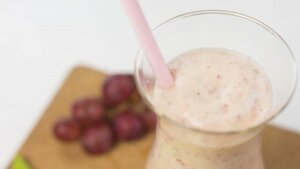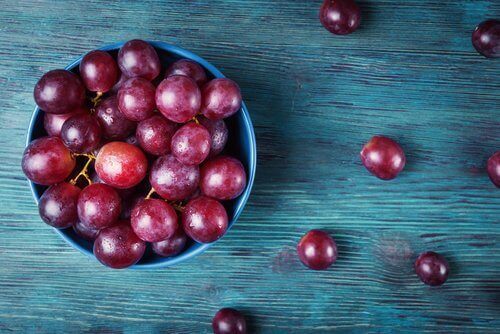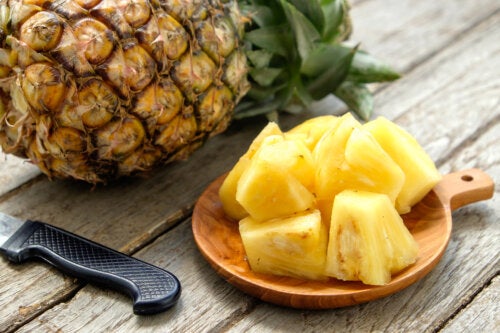Grape and Pineapple Juice for Cholesterol Reduction


Reviewed and approved by the doctor Maricela Jiménez López
Cholesterol is a lipoprotein found in the blood of humans and animals. Although its links to cardiovascular risk is beginning to be questioned nowadays, it’s a good idea to keep it within the recommended parameters. Plant foods such as grape and pineapple juice could help the body eliminate excess cholesterol.
80% of cholesterol is generated by the liver, while 20% comes from dietary foods. This substance plays an important role in the transport of lipids through the blood.
When we lead an unhealthy lifestyle and, especially, a poor diet, the body’s lipid profile can be altered. This alteration could cause certain problems at the cardiovascular level.
To reduce cholesterol and enjoy a good quality of life it’s very important to modify eating habits. In addition, you should avoid foods that can generate an accumulation of this substance in the body.
What is this juice to reduce cholesterol?
This juice to reduce cholesterol combines the properties of grapes and pineapple to make a drink rich in antioxidants which could help to keep this problem under control. To be clearer about what’s recommended to take care of our health, it’s worth finding out more about the benefits of these fruits.

The benefits of grapes to reduce cardiovascular risk
Grapes contain substances that can reduce the risk of cardiovascular disease according to scientific literature. This fruit is rich in antioxidants, vitamins, and minerals that improve cardiovascular health and slow down aging.
However, the most current scientific articles don’t show that consumption of this food produces changes in cholesterol levels. Its reduction in cardiovascular risk is due to its antioxidant effect.
Among the benefits of grape consumption we find:
- High amounts of antioxidants that slow down the action of free radicals in the body.
- High amounts of flavonoids, such as quercetin, catechin and anthocyanin. These provide a protective effect on the heart and prevent the onset of diseases.
- Flavonoids help prevent the formation of blood clots and contribute to good circulation.
- Due to its polyphenol content, it decreases platelet aggregation and reduces the risk of arteriosclerosis.
Find out more here: 6 Benefits of Drinking Grape Juice Regularly
The benefits of pineapple
Pineapple is a fruit rich in water, vitamins, minerals, and antioxidants. These nutrients stimulate the elimination of toxic substances from the body. It’s also very low in calories and can be included daily in your diet to make the most of all its benefits.
Among its benefits to reduce cholesterol we find:
- It has a good fiber content. The regular consumption of fiber helps to control cholesterol levels according to scientific literature.
- Its low caloric and high water content make it an ideal food to include in a low-calorie weight loss diet. In this way, it acts indirectly in the reduction of cholesterol since energy restriction modifies the lipid profile according to the following article.

More great juices here: Red Juice for Healthy Weight-Loss
How to prepare grape and pineapple juice to improve your cardiovascular health
Combining the properties of grape and pineapple we can make a delicious juice rich in nutrients that will reduce our cardiovascular risk. However, it should be clarified that it’s a drink that helps in our diet and that, for optimal results, it’s essential that a person with bad cholesterol should improve their lifestyle habits.
Ingredients
- ½ pineapple
- 15 grapes, approximately
- A glass of water (200 ml)
Instructions
- Firstly, peel and chop the pineapple. Remember to remove the core.
- Then halve the grapes, but don’t remove the skin or seeds.
- Thirdly, put everything in the blender together with a glass of water.
- And, finally, blend it all and serve it chilled.
To keep in mind!
Although diet can slightly modulate cholesterol levels, in many cases there are genetic factors that influence them. As we mentioned earlier, the influence of cholesterol on health is starting to be questioned.
We recommend following a varied and balanced diet as well as practicing physical exercise.
It’s important to follow the doctor’s recommendations when it comes to changing our lipid profile.
All cited sources were thoroughly reviewed by our team to ensure their quality, reliability, currency, and validity. The bibliography of this article was considered reliable and of academic or scientific accuracy.
- Xia, E., He, X., Li, H., Wu, S., Li, S., & Deng, G. (2013). Biological Activities of Polyphenols from Grapes. In Polyphenols in Human Health and Disease (Vol. 1, pp. 47–58). Elsevier Inc. https://doi.org/10.1016/B978-0-12-398456-2.00005-0
- Mattivi, F., Guzzon, R., Vrhovsek, U., Stefanini, M., & Velasco, R. (2006). Metabolite profiling of grape: Flavonols and anthocyanins. Journal of Agricultural and Food Chemistry, 54(20), 7692–7702. https://doi.org/10.1021/jf061538c
- Kuskoski, E. M., Asuero, A. G., Troncoso, A. M., Mancini-Filho, J., & Fett, R. (2005). Aplicación de diversos métodos químicos para determinar actividad antioxidante en pulpa de frutos. Ciência e Tecnologia de Alimentos, 25(4), 726–732. https://doi.org/10.1590/S0101-20612005000400016
- Xia N., Daiber A., Forstermann U., Li H., Antioxidant effects of resveratrol in the cardiovascular system. Br J Pharmacol, 2017. 174 (12): 1633-1646.
- Haghjghatdoost F., Hairi M., Effect of resveratrol on lipid profile: an updated systematic review and meta analysis on randomized clinical trials. Pharmacol Res, 2018. 129: 141-150.
- Sima P., Vannucci L., Betvicka V., B glucans and cholesterol (review). Int J Mol Med, 2018. 41 (4): 1799-1808.
- Santos HO., Macedo RCO., Impact of intermittent fasting on the lipid profile: assessment associated with diet and weight loss. Clin Nutr ESPEN, 2018. 24: 14-21.
This text is provided for informational purposes only and does not replace consultation with a professional. If in doubt, consult your specialist.








